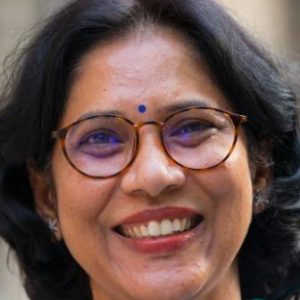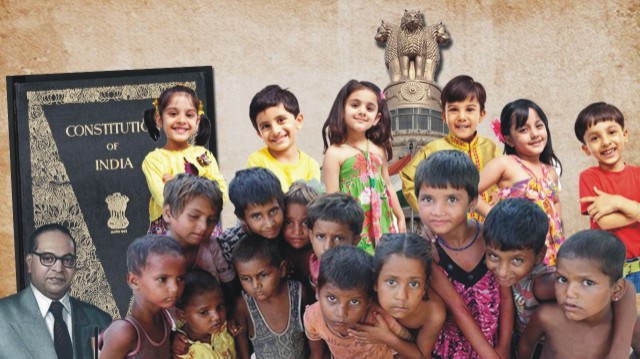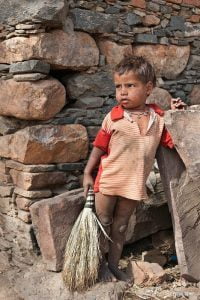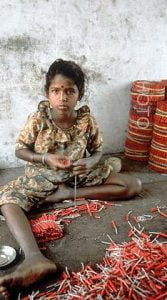

The Constitution of India guides Government and citizens in every sphere of our lives and therefore it is a live document that lives in our thoughts, our actions, our aspirations, and our decisions. Nearly 39 percent of our population, which is the future of our country finds special mention in the Constitution. Article 15 (3) permits positive discrimination in favour of children by providing for the following: “Nothing in this article shall prevent the State from making any special provision for women and children.”
Further, Article 39 (e) and (f) of the Directive Principles of State Policy provide that the State shall direct its policy towards securing to ensure that the tender age of the children are not abused and children are given opportunities and facilities to develop in a healthy manner and in conditions of freedom and dignity and that the childhood.
 Today, as we celebrate the adoption of the Constitution of India, let us see how the promises made by the founders of the Constitution are translated into reality by the State. The 2011 Census revealed a very sad scenario of our children.
Today, as we celebrate the adoption of the Constitution of India, let us see how the promises made by the founders of the Constitution are translated into reality by the State. The 2011 Census revealed a very sad scenario of our children.
The child-sex ratio (CSR), which is defined as number of girls per 1000 of boys between 0-6 years of age, had gone to its lowest level at 918. This was alarming as it implies pre-birth discrimination manifested through gender biased sex selection, and post birth discrimination against girls.
The situation was worst in some states such as Haryana, Punjab, Delhi and Jammu and Kashmir. If this was not controlled, the results would have been devastating disturbing the nature’s balance of girls and boys for a healthy society.
 Prime Minister, launched the “Beti Bachao Beti Padhao” programme in 2015 with mass communication campaign in selected districts with adverse CSR.
Prime Minister, launched the “Beti Bachao Beti Padhao” programme in 2015 with mass communication campaign in selected districts with adverse CSR.
Today as result of the programme, the CSR hasincreased from 871 in 2014 to 923 in 2019 in the worst affected state of Haryana and is on the rise. Commitment of the Government, involvement and innovations by the community has borne fruits and the girlsare now born with liberty and ensured dignity in their lives.
To ensure children are born healthy, Pradhan Mantri Matru Vandana Yojana (PMMVY) was launched as a maternity benefit scheme wherein beneficiaries are provided financial support during pregnancy and lactation if theyfulfill certain nutrition and health seeking conditions. An estimated 51.70 Lakhs beneficiaries per annum are covered under PMMVY.
Once a healthy child is born, keeping the child well-nourished especially in early years of life is the next most important responsibility of the State. The POSHAN Abhiyaan launched in 2018, works towards comprehensively addressing the problem of malnutrition by improving nutritional status of children from 0-6 years, adolescent girls, pregnant women and lactating mothers in a time bound manner. Further, with the aim to ensure safe and wholesome food for school children, Food Safety Standard Authority of India (FSSAI) has notified Food Safety and Standards Regulations, 2020 delineating what is healthy for children and what is not.
 The latest National Family Health survey -5 -Phase 1 shows improvement in nutrition levels of children in big state like Bihar where the number of children below five years of age who are underweight has declined from 43.9% in 2015-16 to 41% in 2019-20. The situation in other states is however, not very positive and there is need to do more to improve nutrition level of children.
The latest National Family Health survey -5 -Phase 1 shows improvement in nutrition levels of children in big state like Bihar where the number of children below five years of age who are underweight has declined from 43.9% in 2015-16 to 41% in 2019-20. The situation in other states is however, not very positive and there is need to do more to improve nutrition level of children.
As the child grows, education is the next priority and also a Constitutional right of every child. The Early Childhood Care and Education Policy (ECCE) is one of the six free services provided to children in the age group of 3-6 years under Anganwadi Services. The new Education Policy, 2020 focuses on ensuring universal access at all levels of schooling from pre-primary school to Grade 12. The results of the Policy will be visible in coming years.
Once the health and development of child is ensured, child’s protection is the next step to ensure childhood is safe and its innocence is not exploited. The new Juvenile Justice (Care and Protection of Children) Act, 2015 was enacted by the Government to ensure children who are in need of care and protection are provided with institutional and non-institutional services so that they remain safe. On the other hand, children who are in conflict with law are dealt with sensitively and reformed to become better citizens of the society.
In 2019, the special law that protects children from sexual offences – Protection of Children from Sexual Offences Act, 2012 was amended in 2019 with stringent punishments including death penalty in case of aggravated penetrative sexual assault. Child pornography is addressed stringently under the amendment, which makes the intention of the Government clear – it is not acceptable and if child is abused online, the abuser will not be spared. The cyber crime portal of Ministry of Home Affairs is an online portal to report such cases and action is taken immediately by the authorities.
As per Government data, over 51,600 cases of rape and POCSO offences have been expeditiously disposed through 660 fast track special courts (FTSCs) in 26 states and the Scheme under which such Courts are formed has been extended recently so that children and women awaiting justice donot have to wait for long and cases are concluded on time.
 The Government has taken and continues to adopt laws, policies and programmes for the health, development and protection of children as not just a Constitutional commitment but also as a moral responsibility towards the future generation of India.
The Government has taken and continues to adopt laws, policies and programmes for the health, development and protection of children as not just a Constitutional commitment but also as a moral responsibility towards the future generation of India.
Kailash Satyarthi Children’s Foundation under the leadership of Nobel Peace Laureate Kailash Satyarthi has been working towards securing rights of children and also empowering children themselves to demand for their rights and also be aware of their Constitutional duties. Several children who are members of Bal Panchayats formed under our flagship programme of Child Friendly Villages have been recognised nationally and internationally for fighting against social issues. Our Campaigns in the ground not only sensitize the community but also support law enforcement agencies by identifying traffickers and child abusers.
Just like the persons associated and inspired by Kailash Satyarthi are working to make our children safe, if every adult of the country which amounts to 61% of population is alert, the remaining population of children of different age groups are safe. Let us pledge on the Constitution Day that we as country will together ensure our children’s childhood remains innocent, secure, healthy and happy, which will result into a strong and powerful India. ![]()
_____________________
Also Read:
Ploughing Tokenism – A Political Machination
Demystifying Demonetization — War on Black Money or Legalized Plunder and Organized Loot?
Need to amend laws like UAPA to provide for punishment for those who slap false
Why not 40 pc tickets for women in Punjab and elsewhere?
Punjab – How a deadly cocktail of Agri-Water-Energy nexus going to destroy it?
North Pole and the ideological conflict of RSS & Hindutva
Jallianwala Bagh Renovation – A Memoricide of Punjab
Politics of Symbolism: Dalit Chief Ministers in India

Disclaimer : PunjabTodayTV.com and other platforms of the Punjab Today group strive to include views and opinions from across the entire spectrum, but by no means do we agree with everything we publish. Our efforts and editorial choices consistently underscore our authors’ right to the freedom of speech. However, it should be clear to all readers that individual authors are responsible for the information, ideas or opinions in their articles, and very often, these do not reflect the views of PunjabTodayTV.com or other platforms of the group. Punjab Today does not assume any responsibility or liability for the views of authors whose work appears here.
Punjab Today believes in serious, engaging, narrative journalism at a time when mainstream media houses seem to have given up on long-form writing and news television has blurred or altogether erased the lines between news and slapstick entertainment. We at Punjab Today believe that readers such as yourself appreciate cerebral journalism, and would like you to hold us against the best international industry standards. Brickbats are welcome even more than bouquets, though an occasional pat on the back is always encouraging. Good journalism can be a lifeline in these uncertain times worldwide. You can support us in myriad ways. To begin with, by spreading word about us and forwarding this reportage. Stay engaged.
— Team PT


Copyright © Punjab Today TV : All right Reserve 2016 - 2024 |